|
The German saying "Liebe geht durch den Magen" (Love passes through the stomach) might have
been coined for my mother. My mother was an excellent cook and baker who cajoled, spoiled, and tyrannized the family from her bastion, the kitchen. Having survived the
Depression, the War and the Berlin Blockade, she remained to some degree "sparsam," frugal, even after the hunger years were over and Germany – my family with it
– prospered again. She operated in the tense zone between scarcity and treats, restriction and feast. One extreme of her food-love economy was her capacity to force
food on her loved ones or anybody special to her – more than most people desired to eat Saying "no" wasn't easy as her dishes, her elegant sauces, adventurous
pizzas or Schwarzwälder Kirschtorte were irresistible. Saying no offended and personally wounded her. Saying no to a second helping meant lacking love and gratitude. She
felt indignant and hurt if you didn't share her taste, her preference. She would work hard to prevent you from adding that beloved deutsche Butter to your boiled potatoes if she had prepared a sauce hollandaise. She wouldn't let you savor her gooseberry tart without a cloud of her slightly sweetened whipped cream on top of it. In short, everything on my mother¬īs table was a powerful appeal to return the love and eat...and eat... as she pleased.
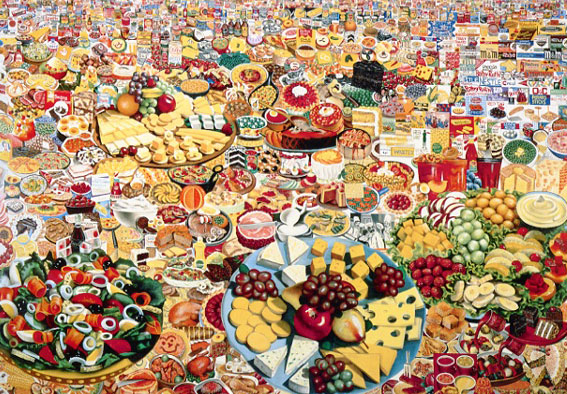
At the same time, she was a master at planning, counting and doling out
what she brought to the table. She would cleverly spruce up leftovers, stretch dishes to make them last another day, withhold treats in order to
provide them more effectively another time, and get quite stern when Saturday guests tried to eat up the cake the family was to have on Sunday.
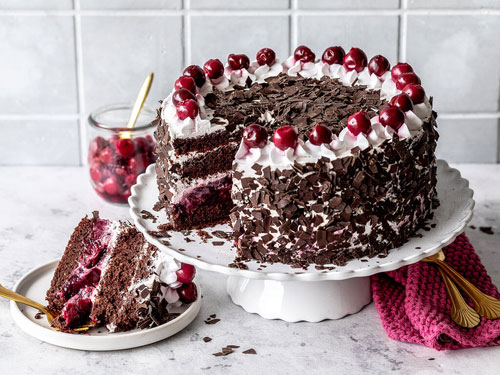
After almost twenty years in my mother¬īs house of Teutonic pleasure
control, I escaped to Paris and fell under the spell of another woman: the artist Meret Oppenheim. Meret was German and in her early sixties like
my mother, but she was in almost every aspect the opposite: artist, bohemian, living an independent life by herself. And she was Jewish.
While I worked as Meret's Girl Friday my food ambivalence acquired new colors.
There was her famous (infamous) fur-lined teacup, saucer and spoon which she had created in Paris, in 1936, and called "Le déjeuner en
fourrure" – "Breakfast in Fur." It had made a star out of the barely twenty year-old artist. The Surrealists saw the furry tea cup as the
"surrealist object" par excellence, and New York' MOMA bought it in a snap.
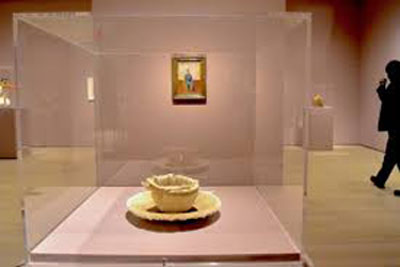
Some thirty years later, the "Breakfast in Fur" remained Meret's calling card and became the foundation of her come-back after decades of
depression. When I met her in 1974, I was troubled and intimidated by this iconic piece of art. It seemed as disgusting as it was alluring. I
couldn't stop imagining hot chocolate in that cup -- like having to drink a cup of chocolate filled with hair, animal hair. How could this beautiful
woman invent such a beastly horror? But when I encountered the perverse object in the first-ever retrospective of Meret's work, I fell in
love with it. The gazelle fur she had used to line the cup created the illusion of an exquisite golden meadow on some shape-shifter planet,
radiating innocence. I saw the piece as an embodiment of the paradise garden -- the sensuous temptation and the fall into the scary knowledge of sex.
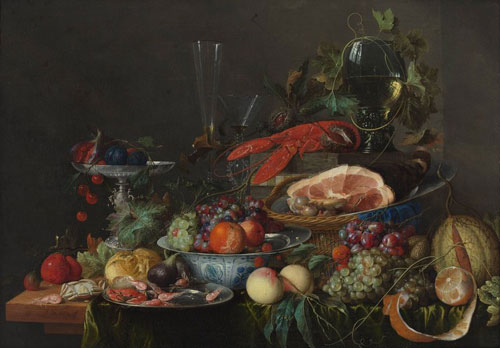
During the seventies, I followed Meret's move from a small, monk-like
studio in a back alley at the edge of Paris, to a lush studio apartment in the center, the newly chic quartier Le Marais. Her paintings and objects
now went for thousands of francs. But Meret did not seem to register her affluence. She dressed in a simple jeans "uniform" and continued her
monkish life style. Her anxiety over money never abated. One moment she spent a small fortune on some young schizophrenic artist in an
asylum, and in the next obsessed over the tip of a few francs for a cab driver. She could go into extravagances like drinking through the night
with her old Parisian buddies at the Brasserie Lip or La Coupole, but would only reluctantly pay my small hourly rate.
After our mornings, when she had painted and I had grounded a new
canvas, written letters and checks or worked on her "catalogue raisonné"( the book of her complete works), we would sit down together for lunch
and discuss the feminist sujet du jour (Could women finally be artists ? Was women's art different from men's?).
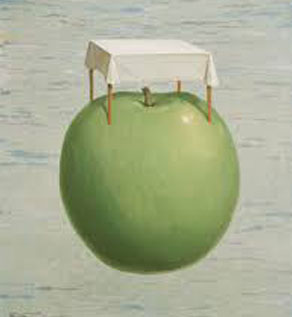
Lunch invariably consisted of an apple and a few slices of excellent French cheese. This did not strike me as stingy, but as an amazing
capacity for the essential. Her lunch seemed to mirror the understated style of her work. An ascetic meal of this kind, with its concentration on
only two pure tastes, one salty-tangy, the other sweet, seemed elegant to me, like the French way of serving meals one food, one taste at a time –
instead of the German way of heaping everything onto the same plate.
Secretly, however, I also felt a grudge because the famous artist didn't
wish to spoil me with treats. Was the fur-lined tea cup perhaps a form of food aggression? The violent aversion of anorexia? No matter, I adopted
Meret's eccentric style of eating as my own, not realizing the familiarity. Meret's frugality in the midst of opulence was not that far removed from my mother's bouts of Sparsamkeit
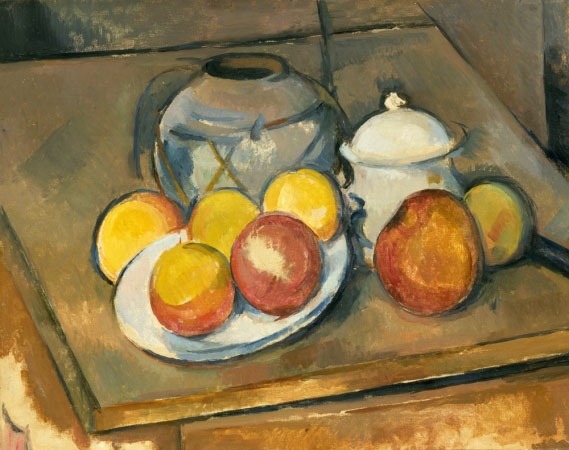
What a contrast then, some years later, when I entered my Jewish partner Kim Chernin¬īs house in Berkeley, California. Kim was a writer who had made money with her books, and when she hosted, she treated
her guests without any restraint. Watching Kim's hospitality, her planning, buying and preparing food for a lunch or dinner invitation was
a shock. If one baguette was needed, there would be three. If four people were expected for tea, there would be two cakes, ten muffins and a
cookie plate. Was this necessary? Wouldn't our health-conscious friends feel oppressed by the sight, as I did? Wouldn't a little less be more – perhaps be more stylish?
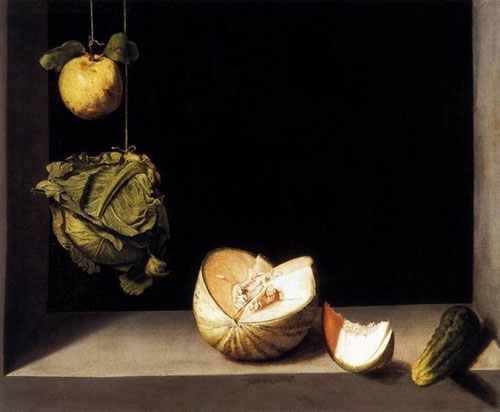
It took many debates and even fights for me to realize that Kim¬īs largesse threw me right back into the dread of having to gulp down
second and third helpings of everything– for love. My mother was still watching my plate. The moment I had a last potato or green bean left, she
would shoot forward with her bowls: "Na, noch ein Kartöffelchen?" "How about another little potato? A couple more beans? A pity to leave these
few beans behind!" (My nephew recently told me that he used to make sure never to polish off any part of his meal before the end – to avoid my mother's attention.)
Kim helped me realize that her hospitality didn't endanger me. I didn't
have to eat any of it to please her. We didn't even have to keep eating leftovers for the next five days – another challenge. It used to be a moral
failure, a crime, to waste (or, God forbid, trash) any morsel of food. What was left over from Kim's invitations went home with the guests who loved the food.
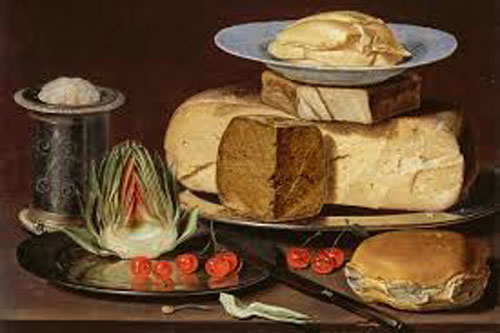
Kim found the fitting label for my food anxiety, calling it "Kriegskind,"
my "war child" mentality. Guilt over not showing proper appreciation or appetite. Nausea at the sight of an over-loaded table or heaped-up plate.
Reluctance to finish my meals, leaving behind little bits that would wander into the fridge and never come out again. Sticking to appetizers
at American restaurants because entries were monstrosities. "Kriegskind" gave me permission to laugh at my quirks, at being stuck in the past, at my mother's table.
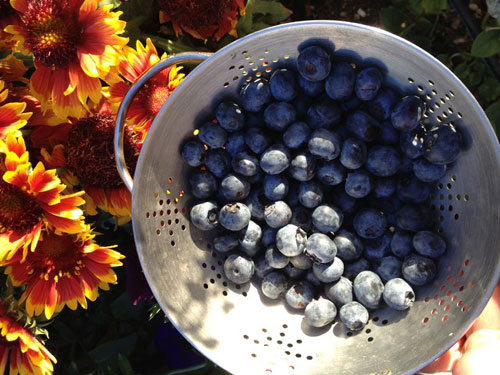
Of course, I had to come to Kriegskind's defense. It wasn't a question of
the ur-German "anal" affliction, the stingy withholding of gratification. If I waited until lunchtime for my first cup of coffee, it was because I could
look forward to it all morning. A different pleasure principle was at work, I argued: an attachment to a period of deprivation when every bite of
food was a miracle. Kriegskind rememberd what it was like shortly after the War, during the Berlin Blockade, when none of us kids on my street
had any candy. In the harsh Berlin winter, we'd run around with a slice of lemon glued to the back of our hand that we licked like a lollipop. If we
were lucky our mothers would allow us to dip our lemon sliver into sugar once or twice. In spring and summer, we¬īd suck tiny bits of nectar out of
the flowers of Acacia trees. We'd hunt for wild cherries, for any berry bush that wasn't fenced in. In the fall we'd chew on sun flower seeds and
cracked the triangular seeds of beech tress with our teeth. A piece of chocolate, a gummi bear or a caramel were rare and extraordinary
treasures. I remember what my grandfather brought home from the Black Market in his big brown leather bag: the first banana, the spiky
hedgehog of the first pineapple. And finally the first candy that could not be swallowed -- a chewing gum. I remember a winter day when my
mother joined my sister and me at the window. We were watching snowflakes through small holes we were breathing into the ice flowers
covering the pane. My mother carefully cut a bright ball of fruit into quarters on a plate. She handed us our first taste of an orange, saying in a
voice that I never forgot, "Every drop is precious..."

Food as treasure and adventure, food that appears as if by magic has followed me through my bohemian years in Paris, when I gleaned the
market for overripe fruit and wilted vegetables in the crates left behind for the garbage trucks, or negotiated for yesterday's bread at the bakery.
The wild berries or hazelnuts that I usually detect on my walks in the countryside and collect (a capacity that drove most of my lovers to
distraction), the corn husk snatched from a field, or even the few cherry tomatoes grown in a pot at my kitchen window, remain some of my
favorite foods. Thanks to some powerful women, my mother, my Paris mentor, my Jewish-American lover, my food paradox is alive and
well. I am able to enjoy a guilt-free feast, but am still holding out for a whiff of the miraculous. My frugality, I used to tell Kim, is a loyalty, a
nostalgia for my Berlin childhood, a search for lost time. In short, a romance.
|